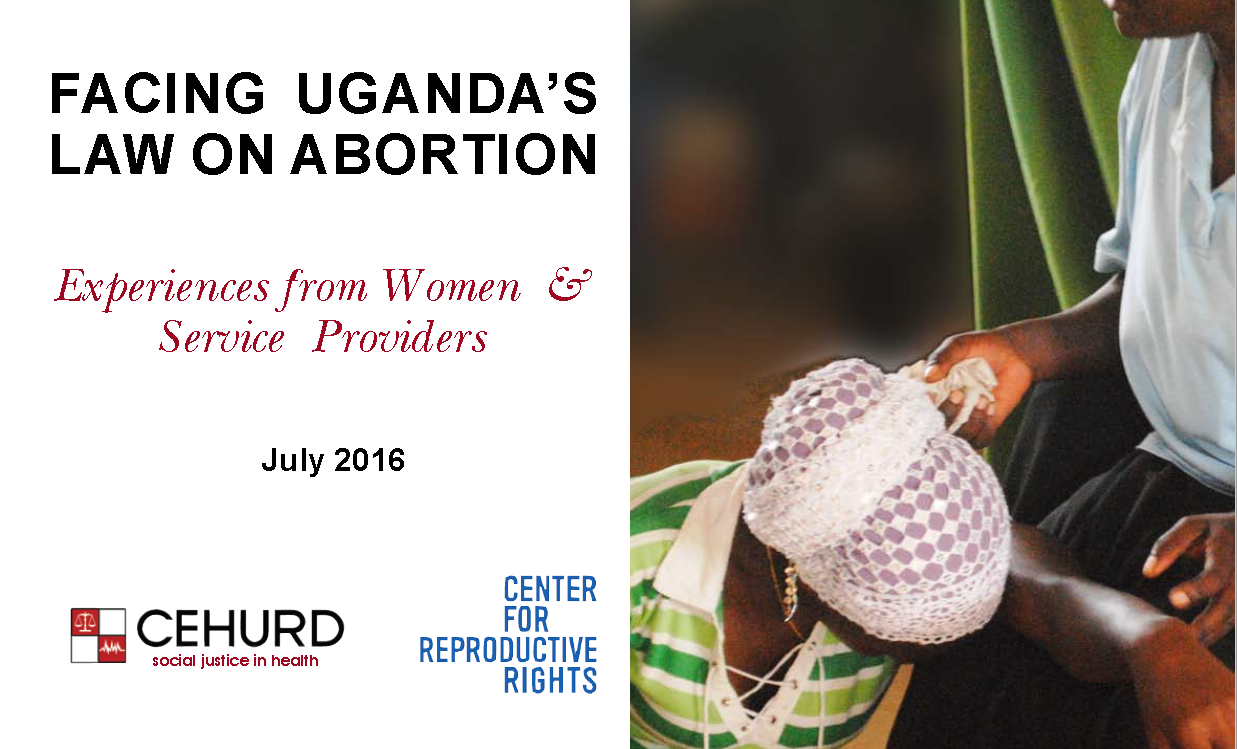07.28.16 – (PRESS RELEASE) Due to the unclear abortion law in Uganda, women and adolescents continue seeking unsafe abortions and are vilified by their families and communities—even the doctors and health workers who provide legal post-abortion care are being arrested, according to a new report by the Center for Health, Human Rights and Development (CEHURD).
“Facing Uganda’s Law on Abortion: Experiences from Women and Service Providers” is a sexual and reproductive health advocacy publication highlighting experiences and perspectives of individuals who have been affected by or dealt with abortion. The publication includes interviews with women and girls who ended pregnancies, as well as doctors, nurses, health worker, lawyers, police and community members.
Abortion in Uganda is legal in limited circumstances, yet approximately 85,000 women each year receive treatment for complications from unsafe abortion and an additional 65,000 women experience complications but do not seek medical treatment.
“Every woman and adolescent girl has a right to make informed decisions about their reproductive health,” said Onyema Afulukwe, senior legal advisor for Africa at the Center for Reproductive Rights. “Uganda’s abortion law punishes women and girls who choose to end a pregnancy and criminalizes the health workers that offer them legal post-abortion care. This new report shows that now, more than ever, the Ugandan government must clarify its law and expand access to safe and legal abortion services.”
The Center for Reproductive Rights provided technical support for the CEHURD report, which addresses the current state of the abortion law in Uganda, the difficulties accessing lawful and safe abortion services, as well as enforcement of the abortion law by both the police and local communities.
Individuals stories highlighted in the report include among others:
- Nabukeera Sarah, a 15 year old who was drugged and raped by a health worker when seeking medical treatment, and had to turn to an illegal abortion,
- Kadaga Henry Francis, who was arrested and detained after providing a woman with post-abortion care who later died from unsafe abortion complications,
- Wasswa Alex, a local community leader who reported a rape survivor with intellectual disabilities to police after neighbors ganged up on the woman for ending the pregnancy
“These personal stories demonstrate how Uganda’s abortion law is working against the women and adolescents who need reproductive health services, and the health professionals who should be able to practice medicine without fear of incarceration,” said Moses Mulumba, executive director of CEHURD. “It’s time the government amend the abortion law and implement health policies to ensure women and girls can get the health services they need and deserve.”
The Center has worked extensively in Uganda on the human rights implications of lack of access to legal abortion and modern contraceptives. In November 2013, the Center, the International Women’s Human Rights Clinic and the O’Neill Institute for National and Global Health Law at Georgetown Law released a joint report entitled The Stakes Are High: The Tragic Impact of Unsafe Abortion and Inadequate Access to Contraception in Uganda. The report documents personal stories of women impacted by the widespread and false impression that abortion is illegal in all circumstances in Uganda— when in fact it is permitted for women with life-threatening conditions and victims of sexual assault.
In 2012, the Center launched its first research report on Uganda’s laws and policies on termination of pregnancy. The report found that the laws and policies are more expansive than most believe, and Uganda has ample opportunity to increase access to safe abortion services.
PRESS CONTACTS:
Natalia Garzon, Senior Press Officer, Center for Reproductive Rights
Mobile: 00 1 917 257 9793 / Skype: Garzon_crr / Email: ngarzon@reprorights.org
Maxie Ayebare, Communications Officer, Center for Health Human Rights and Development
Mobile: +256 791 845559 / Skype: maxie.ayebare /Email: ayebare@cehurd.org

